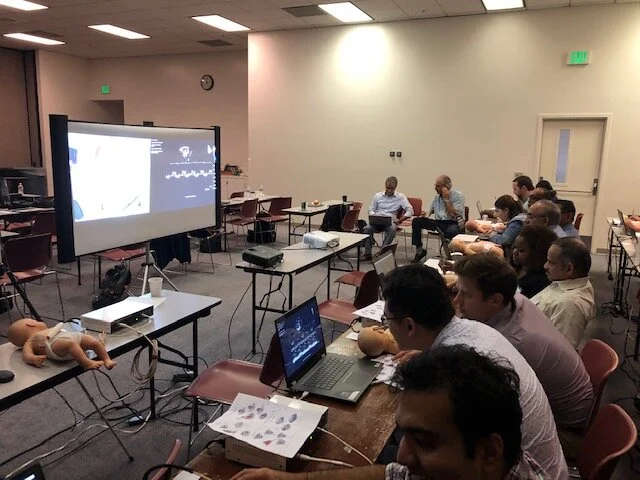
Point of Care Echocardiography in the Neonate
Point of Care Echocardiography Training Program
Shahab Noori, MD, Mahmood Ebrahimi RDCS, Merujan Uzunyan MD, Yogen Singh MD, Rangasamy Ramanathan MD
Cardiovascular pathology constitutes an important component of the management of neonates in the Neonatal Intensive Care Unit. Point of Care Echocardiography (POCE) is designed to enhance knowledge and practical skills of the Neonatology fellows to evaluate cardiovascular disease processes in real-time, serially assess responses to therapeutic interventions and assist with procedures .
General Aims:
To enhance the knowledge of hemodynamics and ultrasonography of the heart and other organs among neonatology fellows and interested attending physicians.
To train and test competency of interested neonatology fellows and attending physicians in performing and interpreting POCE on the simulator.
To train and test competency of interested neonatology fellows and attending physicians in performing and interpreting POCE on the patient.
The program offers 3 levels of ultrasound training:
I. A 5-day comprehensive echocardiography course as an introduction to POCE
II. Basic training in point of care Echocardiography
III. Advanced training in point of care Echocardiography
Interested physician must successfully complete requirements of each level prior to moving to the next level.
5 days course in POCE
This course is mandatory for our first-year fellows and is open to USC faculty in the division and outside physicians. The course is offered once a year in September.
The 5-day course will cover the following topics:
· Basic principles of ultrasonography
· Basic features of echocardiographic scanners
· Normal cardiac anatomy as revealed by 2D images
· Standard echocardiographic views
· Assessment of shunt at foramen ovale and patent ductus arteriosus
· Assessment of systolic and diastolic function of the heart
· Estimation of left and right ventricular output and superior vena cava (SVC) flow
· Assessment and estimation pulmonary arterial pressure
· Assessment of hypertrophic cardiomyopathy in infants of diabetic mothers
· Evaluation of pericardial effusion and early signs of cardiac tamponade
· Assessment of inferior vena cava (IVC)
· Fetal echocardiography in evaluation of cardiovascular function: arrhythmia, congestive heart failure, hydrops, and vascular flow patterns
· Aneurysm of PDA, cardiomyopathy, systemic to pulmonary arterial shunts
· Effect of ventilator management on cardiovascular function
· Differentiating normal from major congenital heart disease (CHD)
Basic training in POCE
Specific Aim:
Develop Knowledge and skills to understand the hemodynamics and read and interpret echocardiograms as it relates to the assessment and evaluation of PDA, cardiac function and pulmonary hypertension and obtain basic 2D images from neonates requiring critical management
This level of training is a requirement for all the USC fellows in Neonatal-Perinatal Medicine.
It is also available for the USC faculty in the division. This level of training will become available for outside physicians once a structured program is in place.
Each fellow spends a 2-week block, 10 full days, each year training on the simulator and acquiring the basic theoretical knowledge on neonatal hemodynamics. Each fellow is provided with a copy of the textbook on Practical Neonatal Echocardiography and expected to read and understand the relevant chapters in the book.
The training will focus on image acquisition of standard views, assessment of cardiac function, assessment of PDA and PFO flow, assessment and estimation of pulmonary pressure, assessment of myocardial dysfunction and differentiating normal form abnormal heart. For non-simulation echocardiography cases, the trainee will use the standalone software for hemodynamic measurements.
Upon successful completion of training on the simulator, demonstrating competency in performing echocardiography independently and reading prerecorded echocardiograms, the trainee will be granted a Certificate of Competency in basic POCE.
Advanced training in POCE
After completion of the first 2-week rotation, if the trainee is interested in further acquiring the skills with the goal to enroll in the advanced POCE, he/she will work with the POCE fellowship program directors to plan for an enhanced training throughout fellowship program beyond the two weeks rotations
This level of training is only available to the USC fellows and faculty in the division. There is potential for future expansion of this level of training to outside physician using web-based teaching.




